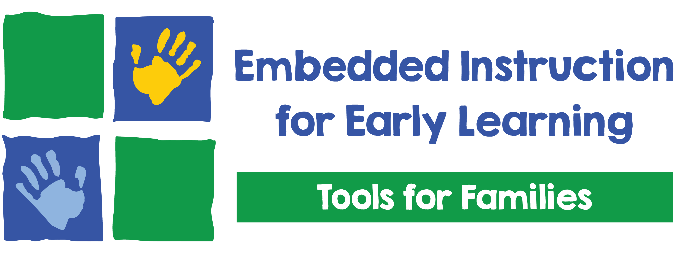Our Roots
Tools for Families is one part of Embedded Instruction for Early Learning that focuses on building home-school connections to support embedded learning in the classrooms, at home, and in the community. The information, tools, and resources provided in this toolkit include content that was developed and adapted from previous projects that focused on supporting people to do embedded learning with infants, toddlers, and preschoolers. Read more about Tools for Families and related projects is below.

Related Projects
Embedded Instruction for Early Learning: Tools for Families
Building on Embedded Instruction for Early Learning: Tools for Teachers (R324A07006; R324A150076), this project is developing and evaluating a new part of Embedded Instruction for Early Learning known as Tools for Families. This project extends previous research on embedded instruction for children with or at risk for disabilities. Tools for Families focuses on developing, validating, and evaluating materials and accompanying tools to enhance collaborative partnership practices between teachers and families to support the use of embedded instruction across home, school, and community settings to benefit child development and learning.
Read the IES abstract here.
- Funding Source: Institute of Education Sciences
- Funding Period: 7/1/2020 – 6/30/2024
- Funding Number: R324A200044
Team:
Crystal Bishop, Principal Investigator, University of Florida
Patricia Snyder, Co-Principal Investigator, University of Florida
James Algina, Co-Principal Investigator, University of Florida
Mary McLean, Investigator, University of Florida
Impact of Professional Development on Preschool Teachers' Use of Embedded-Instruction Practices: An Efficacy Trial of Tools for Teachers (Past)
The goal of this study was to examine the efficacy of Embedded Instruction for Early Learning: Tools for Teachers (R324A070008), a professional development intervention for using embedded instruction with preschool children with or at risk for disabilities. Embedded instruction is an evidence-informed approach for providing instruction to young children in the context of everyday activities and routines. This study used a cluster, randomized controlled trial to compare the efficacy of two versions of Tools for Teachers professional development program, using on-site coaching versus web-based self-coaching and a “business-as-usual” comparison group to determine effects on teachers’ embedded instruction practices and children’s outcomes.
Read the IES abstract here.
- Funding Source: Institute of Education Sciences
- Funding Period: 7/1/2015 – 6/30/2020 (no-cost extension)
- Funding Number: R324A150076
Team:
Patricia Snyder, Principal Investigator, University of Florida
Mary McLean, Co-Principal Investigator, University of Florida
James Algina, Co-Principal Investigator, University of Florida
Crystal Bishop, Project Coordinator, University of Florida
Brian Reichow, Investigator, University of Florida
Mary Louise Hemmeter, Site Principal Investigator/Co-Principal Investigator, Vanderbilt University
Impact of Professional Development on Preschool Teachers' Use of Embedded Instruction Practices (Past)
This project was the initial study focused on the development, validation, and evaluation of Embedded Instruction for Early Learning: Tools for Teachers (EIEL-TfT). The project involved three key phases: developing EIEL-TfT, validating it with diverse stakeholders who would implement or oversee the implementation of EIEL, testing EIEL-TfT feasibility and examining its potential efficacy. The promising evidence identified in this development and innovation project led to the Efficacy Trial for Tools for Teachers (R324A150076).
Read the IES abstract here.
- Funding Source: Institute of Education Sciences
- Funding Period: 3/1/2007 – 2/28/2011
- Funding Number: R324A070008
Team:
Patricia Snyder, Principal Investigator, University of Florida
Mary Louise Hemmeter, Co-Principal Investigator, University of Florida
Mary McLean, Co-Principal Investigator, the University of Wisconsin–Milwaukee
Susan Sandall, Co-Principal Investigator, University of Washington
Tara McLaughlin, Project Coordinator, University of Florida
Embedded Instruction California
The Embedded Instruction California (EI-CA) project is a collaboration among the California Department of Education, Special Education Division, and Napa County Office of Education Desired Results Access Project. Using implementation research and practices, this project’s team collaborates with the Desired Results Access Project and state and teams in local sites to support adaptation, installation, implementation, sustainability, and scale-up of Embedded Instruction for Early Learning (R324A070008) in the California context. Local and statewide coaches support preschool practitioners in partner sites throughout California working in inclusive classrooms to implement Embedded Instruction for Early Learning practices.
- Funding Source: Napa County Office of Education
- Funding Period: 7/1/2015 – present
Team:
Patricia Snyder, Principal Investigator, University of Florida
Mary McLean, University of Florida
Darbianne K. Shannon, University of Florida
Crystal Bishop, University of Florida
Therese Snyder, Project Coordinator, Desired Results Access Project, Napa County Office of Education
Patty Salcedo, Director, Desired Results Access Project, Napa County Office of Education
Steve Lohrer, Co-Director (former), Desired Results Access Project, Napa County Office of Education
Elizabeth Schroeder, Director of Research, Desired Results Access Project, Napa County Office of Education
Larry Edelman, Consultant, Desired Results Access Project, Napa County Office of Education
Florida Embedded Practices and Intervention with Caregivers Early Steps Professional Development
Florida Embedded Practices and Intervention with Caregivers (FL-EPIC) Early Steps Professional Development (ESPD) is a collaboration that began in 2017 among the Anita Zucker Center at the University of Florida, the CEC-RAP Center at Florida State University, the Florida Department of Health, Children’s Medical Services, Early Steps program, and local Early Steps programs throughout Florida. FL-EPIC was adapted from EPIC (R324A130121) for use in the Florida Early Steps program (an early intervention program for infants and toddlers with or at risk for disabilities and their families). The primary goal of FL-EPIC ESPD is to support and examine the installation, implementation, sustainability and scale-up of FL-EPIC across the state of Florida. Throughout Florida, early intervention sites are supported by local and statewide leadership teams, including coaches, to implement FL-EPIC practices.
- Funding Source: Florida Department of Health
- Funding Period: 7/29/2019 – present
- Contract Number: COQXY
Team:
Patricia Snyder, Program Director/Principal Investigator, University of Florida
Crystal Bishop, Co-Program Director/Project Coordinator, University of Florida
Cinda Clark, Research Assistant, University of Florida
Jennifer Harrington, Post-Doctoral Affiliate, University of Florida
Mollie Romano, Principal Investigator/Co-PI, Florida State University
Juliann Woods, Co-Principal Investigator, Florida State University
Initial Efficacy Trial of Florida Embedded Practices and Intervention with Caregivers (FL-EPIC)
Florida Embedded Practices and Intervention with Caregivers (FL-EPIC) is adapted from EPIC (R324A130121). It builds on longstanding collaborations between the University of Florida’s Anita Zucker Center and the CEC-RAP Center at Florida State University to support caregiver coaching and embedded practices and intervention in early intervention programs throughout Florida. This study will provide additional efficacy evidence for FL-EPIC in which providers learn home visiting practices that build families’ confidence in supporting their children’s learning during everyday routines and activities. This project’s transdisciplinary team partners with local Early Steps programs across Florida to identify providers and families to participate. The intervention includes caregiver coaching using home visiting practices and supporting caregivers to develop family and child plans for learning in everyday routines and activities (i.e., embedded intervention). It also involves job-embedded professional development for providers, including workshops and practice-based coaching.
Read the IES abstract here.
- Funding Source: Institute of Education Sciences
- Funding Period: 7/1/2021 – 6/30/2025
- Funding Number: R324A210081
Team:
Patricia Snyder, Principal Investigator, University of Florida
James Algina, Co-Principal Investigator, University of Florida
Crystal Bishop, Co-Principal Investigator, University of Florida
Wei Li, Investigator, University of Florida
Mollie Romano, Site Principal Investigator/Co-Principal Investigator, Florida State University
Juliann Woods, Co-Principal Investigator, Florida State University
Embedded Practices and Intervention with Caregivers (EPIC): Development and Innovation (Past)
This project built on previous work focused on Family Guided Routines-Based Intervention and Embedded Instruction for Early Learning (R324A070008). The transdisciplinary research team developed and evaluated a caregiver-coaching approach for early intervention providers to support families to embed learning opportunities in everyday activities and routines for their infants and toddlers with significant disabilities. First, the team designed, developed, and validated a caregiver-implemented intervention approach called Embedded Practices and Intervention with Caregivers (EPIC). Once developed, the EPIC approach was evaluated to determine whether it led to providers’ increased use of caregiver-coaching practices, caregivers increased use of embedded intervention practices, and improved child and family outcomes.
Read the IES abstract here.
- Funding Source: Institution of Education Sciences
- Funding Period: 6/1/2013 – 5/31/2017
- Funding Number: R324A130121
Team:
Juliann Woods, Principal Investigator, Florida State University
Patricia Snyder, Co-Principal Investigator, University of Florida
Christine Salisbury, Co-Principal Investigator, University of Illinois, Chicago
Brian Reichow, Investigator, University of Florida
